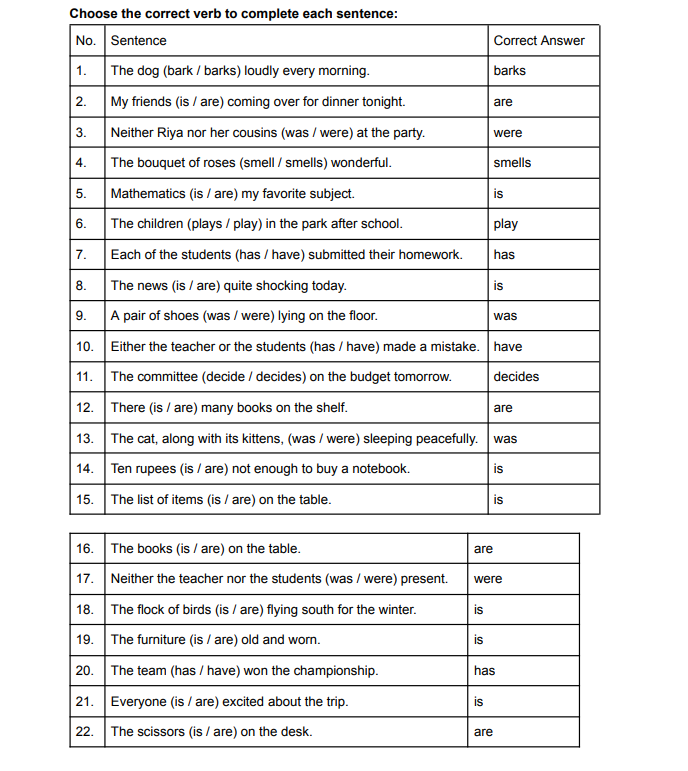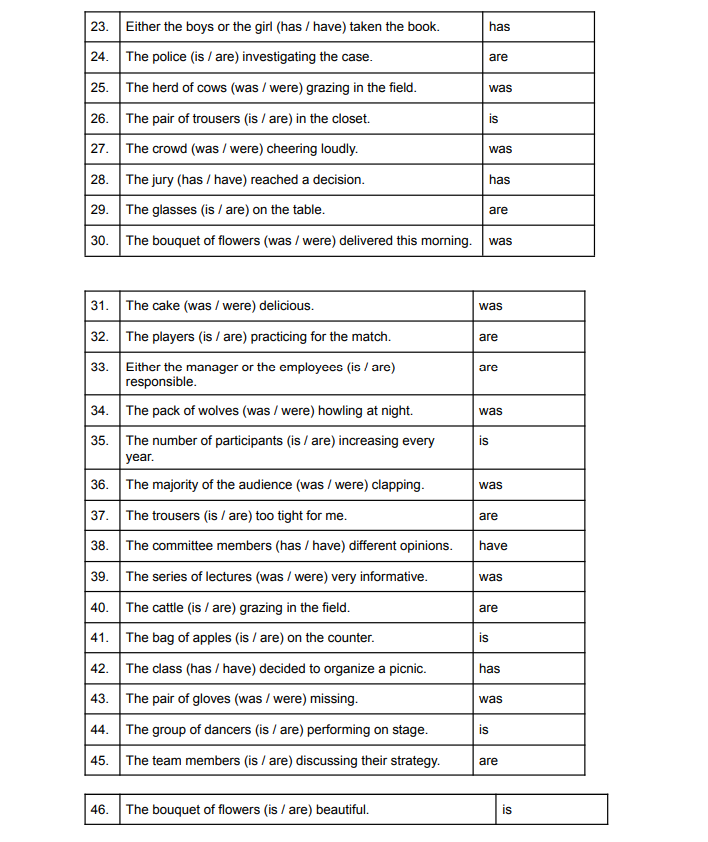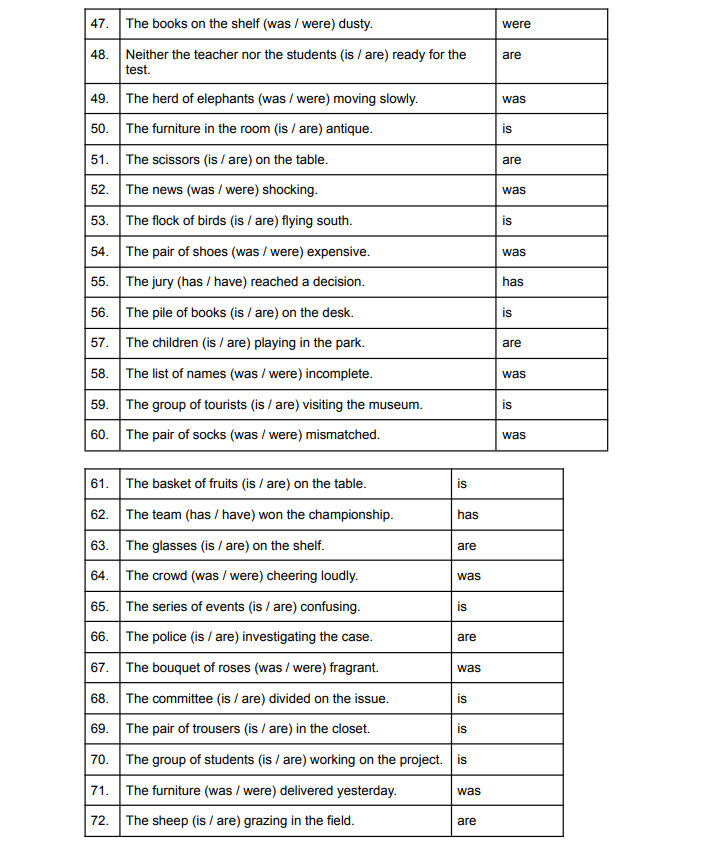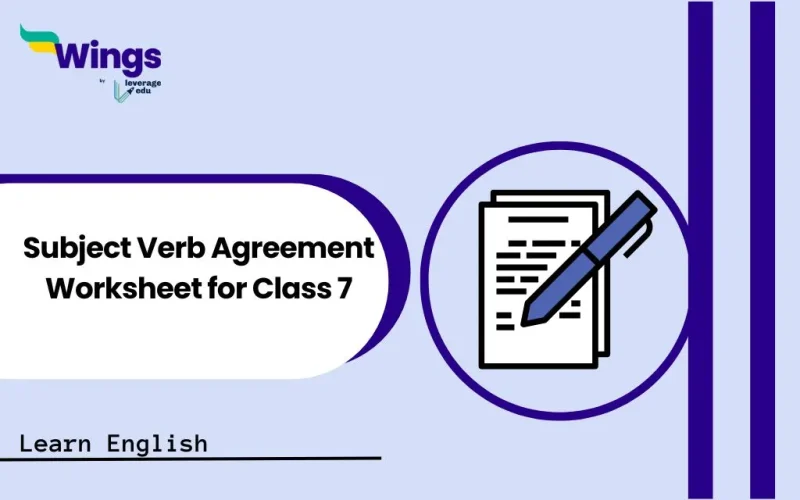Grammar can sometimes feel like a puzzle, especially when it comes to making sure your words play nicely together. One of the most important pieces of that puzzle is subject-verb agreement. It’s the secret to making your sentences sound smooth and clear, like a well-oiled machine! For Class 7 students, mastering subject-verb agreement is a key step towards becoming confident writers and speakers.
That’s why we’ve created this handy Subject Verb Agreement worksheet for Class 7. This isn’t just a list of dry exercises; it’s your chance to practice and perfect this essential grammar skill. Read along the blog to check these worksheets and their answers.
Subject Verb Agreement Worksheet for Class 7 with Answers
Following is a subject-verb agreement worksheet for Class 7 students which we have prepared for you. You can easily save to download and check for the answers mentioned below.



Subject Verb Agreement Topic Review
Subject-verb agreement means the verb in a sentence must “agree” with its subject. They have to match in number – singular or plural. It’s like choosing the right size shoes – one shoe can’t be a size 7 and the other a size 10!
- Singular Subject: Needs a singular verb. (Example: The cat sits on the mat.)
- Plural Subject: Needs a plural verb. (Example: The cats sit on the mat.)
Let us take a look at some of the rules which are used in the subject-verb agreement and will help you enhance your English grammar.
- Simple Subjects: If the subject is one person, place, or thing, the verb is singular. If the subject is more than one, the verb is plural.
- He walks to school. (Singular)
- They walk to school. (Plural)
- “I” and “You”: “I” usually takes a plural verb (except for “am”). “You” always takes a plural verb.
- I am happy.
- I go to the library.
- You are kind.
- You have a book.
Also Read: Subject-Verb Agreement: 12 Rules & Examples
How Important is Subject Verb Agreement in English Grammar?
Subject-verb agreement is extremely important in English grammar for several reasons:
- Clarity: Correct subject-verb agreement makes your writing and speaking clear and easy to understand. When the subject and verb agree, the meaning is immediately apparent. If they don’t agree, it can create confusion and make it harder for the listener or reader to grasp your message. For example, “The dogs barks” is confusing; “The dogs bark” is clear.
- Professionalism: Using correct grammar, including subject-verb agreement, is essential for professional communication. In academic writing, business correspondence, and even casual emails, errors in subject-verb agreement can make you appear less educated or less credible. It’s a sign of attention to detail and mastery of the language.
- Credibility: People often make judgments about others based on their use of language. Consistent errors in grammar can undermine your credibility and make it harder for people to take you seriously. Whether you’re writing a job application, giving a presentation, or simply chatting with a friend, correct subject-verb agreement contributes to a positive impression.
- Effective Communication: The primary goal of language is to communicate effectively. Subject-verb agreement is a fundamental building block of clear communication. When you use correct grammar, you can express your ideas more accurately and persuasively.
- Standard English: Subject-verb agreement is a core component of standard English. Using correct grammar demonstrates your understanding of the rules of the language and allows you to communicate effectively with a wide audience.
- Avoid Misunderstandings: While sometimes minor errors in subject-verb agreement might not completely obscure your meaning, they can still lead to misunderstandings. In more complex sentences, incorrect agreement can significantly alter the intended message.
Also Read: Verb Cheat Sheet
How to Teach Subject Verb Agreement to Class 7 Students?
One can teach subject-verb agreement to class 7 students by following the below-mentioned methods:
- Keeping explanations simple and using relatable examples.
- Making it visual and interactive with games and real-life examples.
- Gradually introduce tricky cases (compound subjects, collective nouns, etc.).
- Providing lots of practice through worksheets and writing activities.
- Connecting it to their lives and explaining its importance.
- Offering consistent feedback and support.
- Using technology wisely.
- Differentiating instruction for varying learning levels.
- Make it fun!
Also Read: Subject Verb Agreement Lesson Plan for English Teachers
FAQs
Ans: A good subject-verb agreement worksheet for class 7 students will cover the fundamental principles, including singular and plural subject-verb matching, agreement with “I” and “you,” handling compound subjects (using “and,” “or,” “nor”), understanding collective nouns, and working with common indefinite pronouns (everyone, somebody, each, every, some, all, any, most). More advanced subject-verb agreement worksheets for class 7 students might also explore more complex sentence structures.
Ans: A subject-verb agreement worksheet for class 7 students typically includes varied exercises like:
Filling in the blanks with the correct verb form (e.g., “The cat ____ (sleep/sleeps)”).
Choosing the right verb from a given list of options.
Identifying and correcting subject-verb agreement errors in the provided sentences.
Rewriting sentences to ensure proper subject-verb agreement.
Ans: Many subject-verb agreement worksheets for class 7 students are aligned with common curriculum standards, like those set by CBSE or other educational boards. However, it’s always a good idea to double-check the content to ensure it matches your specific learning objectives.
Ans: Regular practice is key! Short, frequent practice sessions are more effective than long, infrequent ones. Aim for a few minutes of practice several times a week.
Related Reads:
We hope this blog on the “Subject Verb Agreement Worksheet for Class 7 students ” was informative and helped you improve your English skills. You can also follow the Learn English page of Leverage Edu for more exciting and informative blogs related to English grammar and the English language.


 One app for all your study abroad needs
One app for all your study abroad needs












 60,000+ students trusted us with their dreams. Take the first step today!
60,000+ students trusted us with their dreams. Take the first step today!